List of paintings by Nicolas Poussin
This page is a list of paintings by Nicolas Poussin (Andelys, 15 June 1594 – Rome, 19 November 1665). The attributions vary notably from one art historian to another. Jacques Thuillier, one of the most restrictive, produced a list in 1994 that gave 224 uncontested autograph works and 33 works with minor or major doubts about their attribution to Poussin. Certain attributions have since changed, when paintings thought lost are rediscovered, meaning that this list cannot be considered exhaustive.
List
[edit]This list includes paintings whose locations have been definitely found. The numbers refer to the two last 'catalogues raisonnés' cited in the sources : Thuillier 1994 and Blunt 1966.
| Tableau | Title | Date | Dimensions | Notes | Collection | Number in the Thuillier/Blunt catalogues |
|---|---|---|---|---|---|---|
 | Saint Denis the Areopagite crowned by an angel | 1620–1621 c. | 173 x 108 cm | Painting from the église Saint-Germain-l'Auxerrois (Paris)[1] | Rouen, musée des beaux-arts | 3/R51 |
 | The Death of Chione | 1622 | 109,5 x 159,5 cm | Attributed by Denis Mahon in 1998.[2] Bought in 2016.[3] | Lyon, musée des beaux-arts | |
 | Death of the Virgin | 1623 | 202 x 137 cm | From a retable commissioned by the archbishop of Paris Jean-François de Gondi for Notre-Dame de Paris, seized at the French Revolution and deposited in the Louvre, sent to Brussels in 1803, considered to be a copy, disappeared in 1814. Rediscovered in 2000 at Sterrebeek church.[4] | Sterrebeek, Sint-Pancratiuskerk church | 11/91 |
 | Moses left by the river | 1624 c. | 145 x 196 cm | Bought in Paris in 1742 by Augustus III of Saxony | Dresden, Gemäldegalerie Alte Meister | 15/10 |
 | Triumph of a poet or Triumph of Ovid | 1624–1625 c. | 148 x 176 cm | Attribution contested by Anthony Blunt | Rome, Palazzo Corsini | 13/R92 |
 | Rinaldo and Armida | 1624–1625 c. (or 1630 ?) | 80 x 107 cm | London, Dulwich Picture Gallery | 20/202 | |
 | Cephalus and Aurora | 1624–1625 c. | 79 x 152 cm | Acquired by the Worsley collection before 1770 | York, Hovingham Hall, Worsley Collection | 25/145 |
| The Mount of Olives | 1624–1625 c. | 62 x 49 cm | Oil on copper, formerly in the dal Pozzo collection, rediscovered 1985 | Private collection | 27/ | |
 | Venus and Adonis | 1624–1625 c. | 98.5 x 134.6 cm | Attribution contested by Blunt | Fort Worth, Kimbell Art Museum[5] | 30/R107 |
| Child with a cornucopia | 1624–1625 c. | 54,8 x 51,8 | Recorded in the collection in 1713. Attribution contested by Blunt | Rome, Palazzo Pallavicini-Rospigliosi | 31/ | |
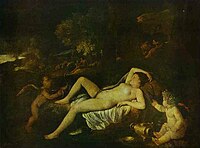 | Sleeping Venus with Cupid or Venus espied by shepherds | 1624–1626 c. | 71 x 96 cm | Mentioned in the inventory of the Electors of Saxony in 1722. Attribution uncertain. | Dresden, Gemäldegalerie Alte Meister[6] | 28/189 |
 | Mercury, Herse and Aglaulus | 1624–1626 c. | 53,5 x 77,5 cm | From the collection of Jacques-Édouard Gatteaux, damaged by fire during the Paris Commune (1871) | Paris, École nationale supérieure des beaux-arts[7] | 29/164 |
 | Rinaldo and Armida | 1625 c. | 95 x 133 cm | Acquired by Catherine II of Russia and sent to Moscow in 1930 | Moscow, Pushkin Museum | 16/203 |
 | Gideon's Battle against the Midianites | 1625–1626 c. | 98 x 137 cm | Commissioned by the Roman nobleman Marcello Sacchetti | Rome, Pinacoteca Vaticana | 21/31 |
 | Joshua's Victory over the Amorites | 1625–1626 | 97,5 x 134 cm | Pendant to Victory over the Amalekites. Sold by Poussin for 7 écus, bought by Catherine II of Russia | Moscow, Pushkin Museum | 18/30 |
 | Joshua's Victory over the Amalekites | 1625–1626 | 97,5 x 134 cm | Pendant to Victory over the Amorites. Sold by Poussin for 7 écus, bought by Catherine II of Russia | Saint-Petersburg, Hermitage Museum | 17/29 |
 | Bacchanale or Bacchus and Ariadne | 1625–1626 | 122 x 169 cm | Mentioned in the catalogue of the Royal Palace of La Granja de San Ildefonso in 1746. Attribution rejected by Blunt but supported by Thuillier and Rosenberg | Madrid, Prado | 24/R66 |
 | Cephalus and Aurora | 1625–1626 c. | 96,9 x 131,3 cm | Bought by the National Gallery in 1831. Re-dated to 1626–1627 from a brand on the back. | London, National Gallery | 43/144 |
 | Venus and Adonis | 1625–1626 (vers) | 75 x 100 cm | Collection of Sir Joshua Reynolds in 1766 | Providence (Rhode Island), Rhode Island School of Design Museum of Art | 42/185 |
 | Landscape with nymph and satyr or Amor Omnia Vincit | 1625–1627 c. | 97 x 127,5 cm | Attribution supported by Rosenberg but rejected by Thuillier and Blunt; Blunt attributes it to Pier Francesco Mola | Cleveland, Museum of Art | R124/R58 |
 | Numa Pompilius and the nymph Egeria | 1625–1628 c. | 100 x 75 cm | Acquired by the duc d'Aumale as part of Frédéric Reiset's collection | Chantilly, musée Condé | 60/168 |
 | The Massacre of the Innocents | 1625–1629 c. | 147 x 171 cm | Painted for Vincenzo Giustiniani. Bought by the duc d'Aumale in 1854 | Chantilly, musée Condé | 19/67 |
 | Venus weeping for Adonis | 1626 | 57 x 128 cm | Mentioned in the inventory of cardinal Angelo Giori. In the French royal collection in 1683 and sent to Caen in 1804. | Caen, musée des Beaux-Arts | 26/186 |
 | The Destruction of the Temple in Jerusalem | 1626 | 145,8 x 194 cm | Painted for cardinal Barberini, who paid Poussin 61 écus for it on 3 February 1626. Passed into cardinal Richelieu's collection, lost at the end of the 18th century. Rediscovered in 1995 and given to the Israel Museum in 1999[8] | Jerusalem, Israel Museum | 35/ |
 | View of Grottaferrata, made up of Venus and Adonis and Landscape with a river god | 1626 c. | 77 x 202 cm (74,5 x 112 cm + 77 x 88 cm) | Dal Pozzo collection. Cut into two parts in the 18th century and reunited in 2009[9] | Montpellier, musée Fabre | 22/R105 |
 | Apollo and Daphne | 1626 c. | 97 x 131 cm | In the Elector of Bavaria's collection in 1782. | Munich, Alte Pinakothek | 23/130 |
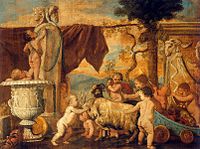 | Children's bacchanal | 1626 | 56 x 76 cm | Tempera. Collection of cardinal Chigi, remained at the Palazzo Chigi until 1914, entered the Italian national collection in 1979 | Rome, Galleria Nazionale d'Arte Antica, palazzo Barberini | 36/192 |
 | Children's bacchanal | 1626 | 74 x 85 cm | Tempera. Collection of cardinal Chigi, remained at the Palazzo Chigi until 1914, entered the Italian national collection in 1979. Not a pendant to the former. | Rome, Galleria Nazionale d'Arte Antica, palazzo Barberini | 37/193 |
 | Lamentation over the dead Christ | 1626 | 102 x 148 cm | In the collections of the Elector of Bavaria in the 18th century | Munich, Alte Pinakothek | 38/82 |
 | Venus surprised by satyrs | 1626 | 77 x 100 cm | Attribution rejected by Blunt then by Thuillier but recently reattributed to Poussin[10] | Zurich, Kunsthaus | B7/R113 |
 | Bacchic scene or Nymph riding a satyr | 1626 c. | 96 x 74,5 cm | Mentioned in 1749 in the collection of William VIII, Landgrave of Hesse-Kassel | Kassel (Hesse), Old masters gallery of the Lande of Hesse | 44/198 |
 | Descent from the cross or The deposition from the cross | 1626 c. | 119 × 98 cm | Collection of Heinrich von Brühl, whole collection acquired by Catherine II of Russia in 1768 | Saint-Petersburg, Hermitage Museum | 39/80 |
 | The Infancy of Bacchus | 1626 c. | 135 x 168 cm | Bought by the duc d'Aumale in England in 1859 | Chantilly, musée Condé | 46/134 |
 | The Mount of Olives | 1626 c. or 1632–1633 | 60,5 x 47 cm | oil on copper, formerly in the Barberini collection. Sold at auction for $6.7 million to a private buyer in January 1999[11] | Private collection | 88 |
 | Helios and Phaeton with Saturn and the Four Seasons or Apollo loaning his chariot to Phaeton | 1626–1627 c. | 122 x 153 cm | Located in Paris in 1674, then Potsdam in 1773 | Berlin, Gemäldegalerie | 51/172 |
 | The Nurture of Bacchus or A Little Bacchanal | 1626–1627 c. | 97 x 136 cm | Acquired by the French royal collection before 1683. Attribution rejected by Anthony Blunt | Paris, musée du Louvre | 50/R64 |
 | The Nurture of Bacchus or The Infancy of Bacchus | 1626–1627 c. | 75 x 97 cm | London, National Gallery | 52/133 | |
 | Venus and Mercury, made up of Venus and Mercury (image, left) and Concert of loves | 1626–1627 c. | 78 x 85 cm et 57 x 51 cm | Original composition known through a drawing in the Louvre. Cut up during the 18th century.[12] | London, Dulwich Picture Gallery and Paris, musée du Louvre | 34/184 |
 | Virgin and Child | 1626–1627 c. | 58,5 x 49,5 cm | Dal Pozzo collection. Pendant to the Piéta at Cherbourg, repainted | Brighton, Preston Manor | 40 |
 | Piéta | 1626–1627 c. | 57,5 x 48,5 cm | Dal Pozzo collection. Pendant to the Brighton Virgin and Child | Cherbourg, musée Thomas-Henry | 41/81 |
 | Bacchus-Apollo or Bacchus and Erigone | 1626–1627 c. (or c. 1628 ?) | 98 x 73,5 cm | Originally used for Bacchus-Erigone, then painted over by Poussin with a Bacchus-Apollo. Much later repainting, to cover the figures' genitalia. | Stockholm, Nationalmuseum | 53/135 |
 | Bacchic scene or Nymph and satyr drinking | 1626–1628 | 74 x 60 cm | Copy of the Moscow painting considered to be by Poussin himself | Madrid, Prado | 45a/200 |
 | Bacchic scene or Nymph and satyr drinking | 1626–1628 | 77 x 62 cm | Copy of the Prado painting considered to be by Poussin himself | Moscow, Pushkin Museum | 45b/200 |
 | Midas washing himself in the source of the river Pactolus | 1626–1628 c. | 97,5 x 72,5 cm | Acquired by the museum in 1871 | New York, Metropolitan Museum of Art | 47/165 |
 | Midas at the source of the Pactolus | 1626–1628 c. | 50 x 66 cm | Sold on 19 February 2011[13] | Ajaccio, Musée Fesch | 48/166 |
 | Olympos and Marsyas | 1626–1628 c. | 102,5 x 89,5 cm | Rediscovered in 1969 by Pierre Rosenberg, bought by the musée du Louvre then returned to its owners in 1978 after a judicial hearing[14] | Private collection | 49 |
 | Narcissus and Cupid | 1626–1629 c. | 53 x 41,9 cm | Rediscovered then sold at auction in 1997[15][16] | Private collection | |
 | Sleeping nymph surprised by satyrs or Venus surprised by satyrs | 1627 | 66 x 50,8 cm | Attribution initially rejected by Blunt and Thuillier, recently backed by Rosenberg after an X-ray | London, National Gallery | B8/R113 |
 | The Poet's Inspiration or The Inspiration of Anacreon | 1627 c. | 94 x 69,5 cm | In the collection of the Elector of Hanover in 1779 | Hanover, Niedersächsisches Landesmuseum Hannover | 72/125 |
 | Acis and Galatea | 1627–1628 | 97 x 135 cm | Given to the gallery in 1916 | Dublin, National Gallery of Ireland | 54/128 |
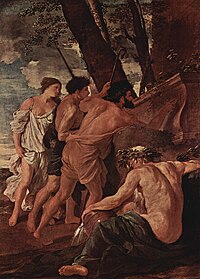 | The shepherds of Arcadia (Et in Arcadia ego) | 1627–1628 | 101 x 82 cm | In the collection of Louis-Henri de Loménie de Brienne (son of Henri-Auguste de Loménie) at the end of the 17th century and entered the collection of William Cavendish, 4th Duke of Devonshire in 1761 | Chatsworth House, Devonshire Collection | 67/119 |
 | Bacchanal with guitar player or The Great Bacchanal | 1627–1628 | 121 × 175 cm | Acquired by cardinal de Richelieu then shifted to the French royal collection | Paris, musée du Louvre | 55/140 |
 | Echo and Narcissus | 1628 | 74 x 100 cm | Acquired by Louis XIV before 1683 | Paris, musée du Louvre | 57/151 |
 | The Death of Germanicus | 1628 | 146 x 195 cm | Painted for cardinal Francesco Barberini. Owned by his heirs until its sale to present owner in 1958 | Minneapolis, Institute of Arts | 58/156 |
 | The Triumph of Flora | 1628 | 165 x 241 cm | Owned by cardinal Omodei. Acquired in 1684–1685 by Louis XIV | Paris, musée du Louvre | 56/154 |
 | The Massacre of the Innocents | 1628 | 97 x 132 cm | Attribution supported by Blunt but rejected by Thuillier | Paris, musée du Petit Palais | B2/66 |
 | The Martyrdom of Saint Erasmus | 1628–1629 | 99 x 74 cm | Modello for the painting intended for St Peter's in Rome. Formerly in the Barberini collection, entered its present owner's collection in 1972 | Ottawa, National Museum of Canada | 68/98 |
 | The Martyrdom of Saint Erasmus | 1628–1629 | 320 x 186 cm | Commissioned in 1628 at the instigation of cardinal Francesco Barberini for a side chapel of Saint Peter's basilica | Rome, Pinacoteca Vaticana | 69/97 |
 | Midas before Bacchus | 1628–1629 | 98 x 130 cm | Located in Munich from 1787 | Munich, Alte Pinakothek | 65/R89 |
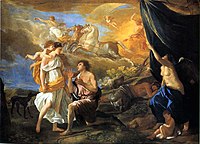 | Diana and Endymion | 1628–1630 (vers) | 122 x 169 cm | Possibly formerly in the collection Jules Mazarin then of Joseph Fesch. Several repaintings by Poussin | Detroit, Institute of Arts | 66/149 |
 | Mars and Venus | 1628–1630 c. | 155 x 213 cm | Formerly in the Dal Pozzo collection | Boston, Museum of Fine Arts | 61/183 |
 | The Inspiration of the Poet | 1629 | 183 x 213 cm | In Thomas Charles Hope's collection in 1824, bought by the Louvre in 1911. Largely reworked, by Poussin himself. | Paris, musée du Louvre | 79/124 |
 | Saint James the Great's vision of the Virgin Mary | 1629–1630 c. | 301 × 242 cm | Possibly painted as an altarpiece for the église Saint-Jacques in Valenciennes. Bought by the duc de Richelieu then entered the French royal collection in 1665 | Paris, musée du Louvre | 75/102 |
 | Holy Family with St John the Baptist | 1629–1630 | 101 x 75,5 cm | Formerly in the collection of Heinrich Thyssen | Karlsruhe, Staatliche Kunsthalle | 74/48 |
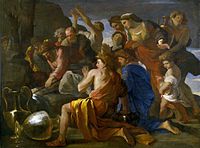 | Moses sweetening the bitter waters of Marah | 1629–1630 (vers) | 152 x 210 cm | Entered Simon Harcourt, 1st Earl Harcourt's collection in England in 1755. Sold at auction in 1948. | Baltimore, Museum of Art | 76/28 |
 | The Return from Egypt | 1629–1630 c. | 112 x 94 cm | Possibly the first version of the painting now in Cleveland | London, Dulwich Picture Gallery | 77/68 |
 | The Holy Family or The Rest on the Flight into Egypt | 1629–1630 c. | 76 x 63 cm | Formerly in the collection of Dr and Mrs Rudolph Heinemann, given to the museum in 1996[17] | New York, Metropolitan Museum of Art | 78/63 |
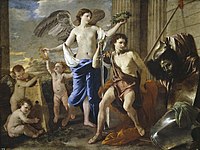 | The Triumph of David or David the victor | 1629–1630 c. | 100 x 130 cm | Collection of cardinal Girolamo Casanate from 1664 | Madrid, Prado | 73/34 |
 | The Rest on the Flight into Egypt | 1630 c. | 88 x 67 cm | Possibly from Pierre Crozat's collection, moved to England in the 19th century | Winterthour, Musée Oskar Reinhart « Am Römerholz » | 80/64 |
 | The Assumption of the Virgin | 1630–1632 c. | 134,4 × 98,1 cm | Attribution supported by Blunt but rejected by Thuillier and Rosenberg (1994) | Washington, National Gallery of Art | B20/92 |
| Children and dogs | 1630–1633 c. | 67,5 x 50 cm | Fragment d'une plus grande toile dont le sujet reste inconnu. In Pierre Crozat's collection, collection acquired by Catherine II of Russia | Saint-Petersburg, Hermitage Museum | 32/195 | |
 | The Plague of Ashdod or The Philistines struck by plague | 1631 | 148 x 198 cm | Finished at the end of 1630 and sold for 110 écus. Formerly in the collection of cardinal Richelieu | Paris, musée du Louvre | 81/32 |
 | Nymph riding a goat or Venus, faun and putti | 1631 c. | 72 x 56 cm | Saint-Petersburg, Hermitage Museum | 82/199 | |
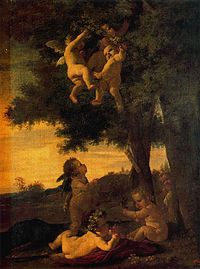 | Children and putti playing | 1631 c. | 95 x 72 cm | Possibly from the collection of Pierre Crozat, which was sold to Catherine II of Russia | Saint-Petersburg, Hermitage Museum | 83/196 |
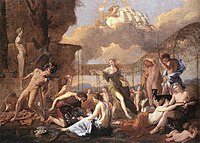 | The Empire of Flora or The Garden of Flora or The flower garden | 1631 | 131 x 181 cm | Sold for 100 écus. Collections of the elector of Saxony from 1722 | Dresden, Gemäldegalerie Alte Meister | 84/155 |
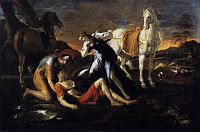 | Tancred and Erminia | 1631 | 98 x 147 cm | Acquired in Paris in 1765 by Catherine II of Russia | Saint-Petersburg, Hermitage Museum | 86/206 |
 | Parnassus or Apollo and the muses | 1631–1632 | 145 x 197 cm | In the Spanish royal collection from 1746 | Madrid, Prado | 85/129 |
 | The Triumph of David | 1631–1633 c. | 117 x 146 cm | Provenance prior to acquisition by Dulwich unknown. Attribution doubted by Mahon, Blunt and Thuillier | London, Dulwich Picture Gallery | 91/33 |
 | Bacchanal before a herm | 1632–1633 | 98 x 142,8 cm | Acquired in 1826 | London, National Gallery | 87/141 |
 | The Return from Egypt | 1632–1633 | 134 x 99 cm | From the collection of the prince of Liechtenstein, sold in 1952 | Cleveland, Museum of Art | 89/ |
 | The miraculous translation of saint Rita of Cascia or The Virgin protecting Spoleto | 1633 c. | 48 x 37 cm | Oil on wood | London, Dulwich Picture Gallery | 97/94 |
 | Adoration of the Magi | 1633 | 160 x 182 cm | Acquired in 1742 in Paris by Augustus of Saxony. Signed Accad. rom. Nicolaus Pusin faciebat Romae 1633 | Dresden, Gemäldegalerie Alte Meister | 93/44 |
 | Adoration of the Shepherds | 1633–1634 | 98 x 74 cm | Possibly from the collection of Joshua Reynolds, passed to the Beauchamp family, entered the National Gallery in 1957. Signed N. Poussin fe. sur la pierre au premier plan. | London, National Gallery | 92/40 |
 | A Dance to the Music of Time | 1633–1634 c. | 83 x 105 cm | Painted for cardinal Ropigliosi, later pope Clement IX, on a theme outlined by the commissioner. Passed to the collections of the duke of Hertford and Richard Wallace | London, Wallace Collection | 141/121 |
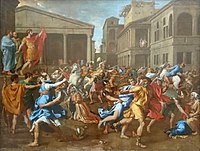 | The Rape of the Sabine Women | 1633–1634 or 1637–1638 | 159 x 206 cm | According to Blunt, this version is older than that owned by the Metropolitan; according to Thuillier, it is the younger of the two | Paris, musée du Louvre | 131/179 |
 | Saint John baptising in the Jordan or Saint John baptising the people | 1633–1634 c. | 95 x 120 cm | Dal Pozzo collection, passed into the collection of the dukes of Rutland in 1785. Belonged to the Fondation et Collection Emil G. Bührle for a time, then acquired by the Getty in 1971 | Los Angeles, Getty Center | 94/70 |
 | Rinaldo's Companions | 1633–1634 c. | 119 x 101 cm | Dal Pozzo collection. Acquired by the museum in 1977. | New York, Metropolitan Museum of Art | 106/205 |
 | Moses making water pour from the rock or The striking of the rock | 1633–1635 | 97 × 133 cm | Collection of Jean-Baptiste Colbert de Seignelay then in the galerie d'Orléans of the Palais-Royal, and finally bought by Francis Egerton, 3rd Duke of Bridgewater. Still owned by Egerton's successors and inheritors. | Edinburgh, National Gallery of Scotland (loan) | 101/22 |
 | Landscape with a man frightened by a snake | 1633–1635 c. | 65 x 76 cm | Acquired around 1920 in Paris by Duncan Grant. Owned by Anthony Blunt avant sa vente au musée. | Montréal, Museum of Fine Arts | 96/215 |
| Children playing | 1633–1635 c. | 52 x 39 cm | Formerly in the collection of the duke of Westminster | Lisbon, Museu Calouste Gulbenkian | 104/R109 | |
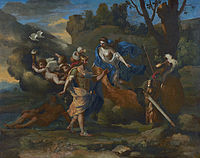 | Venus presenting arms to Aeneas | 1633–1635 c. | 107 x 133 cm | Formerly in the collection of the prince of Cellamare | Toronto, musée des beaux-arts de l'Ontario | 107/190 |
 | Tancred and Erminia | 1634 c. (or 1638–1639) | 75 x 100 cm | Bought in Paris in 1717 by James Thornhill. Acquired by the Institute in 1938 | Birmingham, Barber Institute of Fine Arts | 143/207 |
 | The Rape of the Sabine Women | 1634 | 154,5 x 210 cm | Formerly in the collection of Marie-Madeleine de Vignerot d'Aiguillon. | New York, Metropolitan Museum of Art | 103/180 |
 | The Crossing of the Red Sea | 1634 | 155,6 x 215,3 cm | Pendant to The Adoration of the Golden Calf. dal Pozzo collection. Property of the Earls of Radnor from the 18th century to 1945 | Melbourne, National Gallery of Victoria | 99/20 |
 | The Adoration of the Golden Calf | 1634 | 154 x 214 cm | Pendant to The Crossing of the Red Sea. dal Pozzo collection. Property of the Earls of Radnor from the 18th century to 1945 | London, National Gallery | 100/26 |
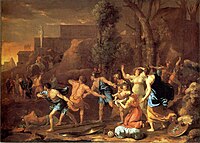 | The young Pyrrhus saved | 1634 | 116 x 160 cm | Paid 70 écus for it on 2 September 1634 by a close contact of the pope. Passed into Richelieu's collection then the French royal collection in 1665 | Paris, musée du Louvre | 108/178 |
 | Landscape with ruins or Landscape with an ancient tomb and two figures | 1634 c. | 72 x 98 cm | Attribution denied by Thuillier. Blunt attributes it to Jean Lemaire, Rosenberg attributes it to Poussin | Madrid, Prado | R142 |
 | Saint John baptising the people | 1634–1635 | 94 x 120 cm | Collection of André Le Nôtre, given to the king of France in 1693 | Paris, musée du Louvre | 102/69 |
 | Camillus and the schoolmaster of Falerii | 1634–1635 c. | 101 x 137 cm | Owned by the princes de Schaumbourg-Lippe in the 18th century. Formerly in the collection of Prince Paul of Yugoslavia. Acquired by the museum in 1970 | Pasadena (California), Norton Simon Museum | 109/143 |
 | Hymen disguised as a woman at a sacrifice to Priapus or Dance in honour of Priapus | 1634–1638 c. | 167 x 376 cm | Commissioned by the king of Spain, possibly the pendant to The Hunt of Meleager and Atalanta | São Paulo, Museum of Art | 116/176 |
 | The Hunt of Meleager and Atalanta or Leaving for a hunt | 1634–1638 | 160 x 360 cm | Commissioned by the king of Spain, possibly the pendant to Dance in honour of Priapus. | Madrid, Prado | 115/163 |
 | Saint Cecilia | 1635 c. | 117,7 cm x 89 cm | Located at the Royal Alcázar of Madrid in 1734. Attribution rejected by Thuillier | Madrid, musée du Prado | B19/96 |
 | The Destruction of the Temple in Jerusalem or The Capture of Jerusalem | 1638 | 147 x 198 cm | Inscribed "Ni Pussin Fec" on the second shield from the right. Commissioned by Barberini to be given to the ambassador of the Holy Roman Empire in 1639 | Vienna, Kunsthistorisches Museum | 132/37 |
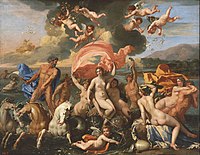 | The Triumph of Neptune or The Birth of Venus (Richelieu Bacchanals I) | 1635 or 1636 | 97,2 × 108 cm | From a series commissioned by cardinal Richelieu for his château of the same name. | Philadelphia, Museum of Art | 110/167 |
 | The Triumph of Silenus (Richelieu Bacchanals II) | 1637 | 143,5 x 121,3 cm | From a series commissioned by cardinal Richelieu for his château of the same name. Considered to be an early copy (1637) of a lost original by Blunt, Thuillier. Considered to be an original Poussin by Rosenberg.[18] and the National Gallery.[19] | London, National Gallery | 111/138 |
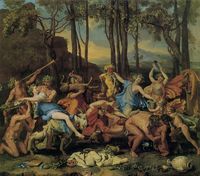 | The Triumph of Pan (Richelieu Bacchanals III) | 1635–1636 | 134 x 145 cm | From a series commissioned by cardinal Richelieu for his château of the same name. | London, National Gallery | 112/136 |
 | The Triumph of Bacchus (Richelieu Bacchanals IV) | 1635–1636 | 128,3 x 151,1 cm | Considered to be an early copy by Blunt and Thuillier. Considered to be a Poussin original by Rosenberg. From a series commissioned by cardinal Richelieu for his château of the same name. | Kansas City, Nelson-Atkins Museum of Art | 113/137 |
| The Seven Sacraments I : Confession (1) | 1636–1640 c. | 95,5 x 121 cm | Destroyed in a fire at Belvoir Castle in 1816 | Destroyed | /108 | |
 | The Seven Sacraments I : Marriage (2) | 1636–1640 c. | 95,5 x 121 cm | Second in the series, preceded by Confession | Belvoir Castle, Leicestershire, Collection of the duke of Rutland | 125/111 |
 | The Seven Sacraments I : Extreme unction (3) | 1636-1640 c. | 95,5 x 121 cm | dal Pozzo collection. Acquired by the dukes of Rutland in 1784–1785. Acquired by The Fitzwilliam Museum in 2012. | Cambridge, The Fitzwilliam Museum | 126/109 |
 | The Seven Sacraments I : Confirmation (4) | 1636-1640 (vers) | 95,5 x 121 cm | dal Pozzo collection. Acquired by the dukes of Rutland in 1784–1785 | Belvoir Castle, Leicestershire, Collection of the duke of Rutland | 127/106 |
 | The Seven Sacraments I : The Commissioning (5) (or Ordination) | 1636–1640 c. | 95,5 x 121 cm | dal Pozzo collection. Acquired by the dukes of Rutland in 1784–1785. Attempted sale in 2010 (estimate of £15 million[20]) Acquired by Kimbell Art Museum in 2011. | Fort Worth, Kimbell Art Museum | 128/110 |
 | The Seven Sacraments I : The Eucharist (6) | 1636-1640 c. | 95,5 x 121 cm | dal Pozzo collection. Acquired by the dukes of Rutland in 1784–1785. | Belvoir Castle, Leicestershire, Collection of the duke of Rutland | 129/107 |
 | The Seven Sacraments I : Baptism or The Baptism of Christ (7) | 1636–1642 | 95,5 × 121 cm | Completed in 1642 in Paris. dal Pozzo collection. Acquired by the dukes of Rutland in 1784–1785. Separated from the rest of the series following a sale in 1939 | Washington, National Gallery of Art | 130/105 |
 | The Feeding of Jupiter or The Infancy of Jupiter | 1636–1637 c. | 96,2 x 119,6 cm | Appeared in the middle of the 18th century | London, Dulwich Picture Gallery | 139/161 |
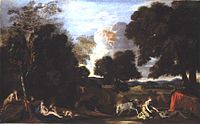 | Landscape with Juno and Argus | 1636–1637 c. | 120 x 195 cm | Cited in 1638 in the Giustiniani family collection in Rome | Berlin, Gemäldegalerie | 95/160 |
 | Camillus hands over the schoolmaster of Falerii to his pupils | 1637 | 252 x 265 cm | Painted for Louis Ier Phélypeaux de La Vrillière | Paris, musée du Louvre | 122/142 |
 | Pan and Syrinx or Syrinx pursued by Pan and turned into a reed | 1637 | 106,5 x 82 cm | Acquired by Augustus III of Saxony in Paris in 1742 | Dresden, Gemäldegalerie Alte Meister | 120/171 |
 | Landscape with Saint Jerome | 1637–1638 | 155 x 234 cm | Belonging to a series of paintings of hermits commissioned from artists resident in Rome by Philip IV of Spain to decorate his Retiro palace | Madrid, Prado | 114/103 |
 | Landscape with a man drinking | 1637–1638 c. | 63 x 78 cm | Possibly from the Dal Pozzo collection, reappeared in 1939. Pendant to Landscape with resting travellers | London, National Gallery | 133/213 |
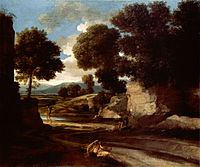 | Landscape with resting travellers | 1637–1638 c. | 63 x 75 cm | Possibly Dal Pozzo collection, reappeared in 1939. Pendant to Landscape with a man drinking | London, National Gallery | 134/214 |
 | The Israelites gathering manna in the desert | 1637–1639 | 149 x 200 cm | Painted for Paul Fréart de Chantelou | Paris, musée du Louvre | 135/21 |
 | Finding of Moses | 1638 | 93 x 121 cm | Previously belonged to André Le Nôtre and given to the king of France in 1693 | Paris, musée du Louvre | 136/12 |
 | Theseus rediscovering his father's sword | 1638 c. | 98 x 134 cm | Architectural decoration painted by Jean Lemaire. | Chantilly, musée Condé | 90/182 |
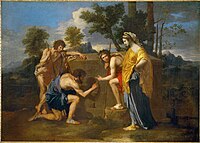 | The Shepherds of Arcadia (Et in Arcadia ego) | 1638–1639 | 85 x 121 cm | Acquired by Louis XIV in 1685 | Paris, musée du Louvre | 137/120 |
 | Saint Margaret | 1638–1640 c. | 220 x 145 cm | Possibly commissioned by Dal Pozzo for a church in the Piedmont | Turin, Sabauda Gallery | 142/104 |
 | Venus presenting arms to Aeneas | 1639 | 105 x 142 cm | Painted for Jacques Stella | Rouen, musée des beaux-arts | 138/191 |
 | Jupiter suckled by the goat Amalthea or The Feeding of Jupiter | 1640 | 97 × 133 cm | Collection of Frederick II of Prussia in 1786 | Berlin, Gemäldegalerie | 145/162 |
 | The Continence of Scipio | 1640 | 114 x 163 cm | Collection of Robert Walpole, collection acquired by Catherine II of Russia in 1772 | Moscow, Pushkin Museum | 146/181 |
 | Landscape with saint Matthew | 1640 | 99 x 135 cm | Sold for 70 écus on 28 October 1640. Left to cardinal Barberini, acquired by the Gemäldegalerie in 1873. Pendant to Landscape with saint John on Patmos | Berlin, Gemäldegalerie | 147/87 |
 | Landscape with saint John on Patmos | 1640 | 102 x 133 cm | Sold for 70 écus on 28 October 1640. Reappeared in 1930. Pendant to Landscape with saint Matthew. | Chicago, Art Institute | 148/86 |
 | The Institution of the Eucharist or Jesus Christ instituting the Eucharist | 1641 | 325 x 250 cm | Commissioned in December 1640 for Louis XIII of France for the chapel of the château de Saint-Germain-en-Laye | Paris, musée du Louvre | 149/78 |
 | Time and Truth or dit aussi Time defending Truth against the attacks of Envy and Discord | 1641 | 297 cm in diameter | Commissioned by cardinal Richelieu for the ceiling of the 'grand cabinet' of his Parisian palace | Paris, musée du Louvre | 152/122 |
 | The Miracle of saint Francis Xavier or Saint Francis Xavier bringing back to life the daughter of an inhabitant of Cangoxima in Japan | 1641–1642 | 444 x 234 cm | Commissioned by François Sublet des Noyers for the high altar of the Jesuit noviciate | Paris, musée du Louvre | 151/101 |
 | Holy Family | 1641–1642 | 71 x 55,5 cm | Painted for the Order of Malta's ambassador to Rome. Acquired by the Institute in 1954. | Detroit, Institute of Arts | 153/46 |
 | Saint Paul's ascension to heaven | 1643 | 41,5 x 30 cm | Painted for Paul Fréart de Chantelou | Sarasota, Florida, John and Mable Ringling Museum of Art | 154/ |
 | The Seven Sacraments II : Extreme Unction (1) | 1644 | 117 x 178 cm | Series painted for Paul Fréart de Chantelou. Passed into the d’Orléans collection, which was broken up in England in 1798. | Edinburgh, National Gallery of Scotland, collection of the Duke of Sutherland(long term loan) | 159/116 |
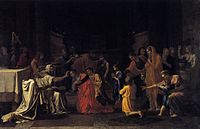 | The Seven Sacraments II : Confirmation (2) | 1645 | 117 x 178 cm | Series painted for Paul Fréart de Chantelou. Passed into the d’Orléans collection, which was broken up in England in 1798. | Edinburgh, National Gallery of Scotland, collection of the Duke of Sutherland | 160/113 |
 | The Seven Sacraments II : Baptism (3) | 1646 | 117 x 178 cm | Series painted for Paul Fréart de Chantelou. Passed into the d’Orléans collection, which was broken up in England in 1798. | Edinburgh, National Gallery of Scotland, collection of the Duke of Sutherland | 161/112 |
 | The Seven Sacraments II : Confession (4) | 1647 | 117 x 178 cm | Series painted for Paul Fréart de Chantelou. Passed into the d’Orléans collection, which was broken up in England in 1798. | Edinburgh, National Gallery of Scotland, collection of the Duke of Sutherland | 162/115 |
 | The Seven Sacraments II : Ordination or Commissioning (5) | 1647 | 117 x 178 cm | Series painted for Paul Fréart de Chantelou. Passed into the d’Orléans collection, which was broken up in England in 1798. | Edinburgh, National Gallery of Scotland, collection of the Duke of Sutherland | 163/117 |
 | The Seven Sacraments II : Eucharist (6) | 1647 | 117 x 178 cm | Series painted for Paul Fréart de Chantelou. Passed into the d’Orléans collection, which was broken up in England in 1798. | Edinburgh, National Gallery of Scotland, collection of the Duke of Sutherland | 164/114 |
 | The Seven Sacraments II : Marriage (7) | 1647–1648 | 117 x 178 cm | Series painted for Paul Fréart de Chantelou. Passed into the d’Orléans collection, which was broken up in England in 1798. | Edinburgh, National Gallery of Scotland, collection of the Duke of Sutherland | 165/118 |
 | The infant Moses trampling pharaoh's crown | 1645 | 101 x 144 cm | D'Orléans collection, sold in England in 1798 | Woburn Abbey (Bedfordshire), collection of the duke of Bedford | 156/16 |
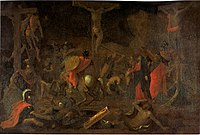 | Crucifixion or Calvary | 1645–1646 | 148 x 218 cm | Commissioned before May 1644 by magistrate Jacques-Auguste II de Thou then owned by the family of Jacques Stella. Acquired by the Atheneum in 1935. | Hartford (Connecticut), Wadsworth Atheneum | 157/79 |
 | Moses changing Aaron's rod into a snake | 1645–1648 c. | 92 x 128 cm | Pendant to The infant Moses trampling pharaoh's crown. Painted for Camillo Massimi | Paris, musée du Louvre | 167/19 |
 | The infant Moses trampling pharaoh's crown | 1645–1648 c. | 92 x 128 cm | Pendant to Moses changing Aaron's rod into a snake. Painted for Camillo Massimi | Paris, musée du Louvre | 166/15 |
 | Moses saved from the river | 1647 | 120 x 195 cm | Acquired by Armand Jean de Vignerot du Plessis and entered the French royal collections in 1665 | Paris, musée du Louvre | 169/13 |
 | Saint John baptising Christ | 1648 | 30 x 23 | Painted for Paul Fréart de Chantelou following a commission granted in 1645. Painted on cupressus panel | New York, collection Wildenstein | 170/71 |
 | Holy Family or Madonna on the stairs | 1648 | 118 x 197 cm | The original according to the archives, with the version held by the National Gallery of Art in Washington only being a copy. Fraudulently exported from France and acquired by the Cleveland Museum, then jointly acquired by them and the Louvre | Cleveland, Museum of Art, Paris, musée du Louvre | 172/53 |
 | Eleazer and Rebecca | 1648 | 118 x 197 cm | Passed into the hands of Armand Jean de Vignerot du Plessis then entered the French royal collection in 1665 | Paris, musée du Louvre | 173/8 |
 | Landscape with the funeral of Phocion | 1648 | 117,5 x 178 cm | Possibly painted for the Lyon businessman Jacques Sérisier. Pendant to Landscape with the ashes of Phocion | Cardiff, National Museum of Wales | 176/173 |
 | Landscape with the Ashes of Phocion | 1648 | 116 x 178,5 cm | Possibly painted for the Lyon businessman Jacques Sérisier. Pendant to Landscape with the funeral of Phocion | Liverpool, Walker Art Gallery | 177/174 |
 | Landscape with a Man Killed by a Snake or The effects of terror | 1648 | 119 x 198,5 cm | Copie ancienne au musée Magnin | London, National Gallery | 178/209 |
 | Landscape with Orpheus and Eurydice or Orpheus and Eurydice | 1648 | 120 x 200 cm | Acquired for the French royal collection in 1685. Upper and lower portions cut off. | Paris, musée du Louvre | 179/170 |
 | Landscape with Diogenes or Diogenes throwing away his bowl | 1648 | 160 x 221 cm | Collection of the duc de Richelieu, acquired by Louis XIV in 1665 | Paris, musée du Louvre | 180/150 |
 | Landscape with Polyphemus | 1649 | 150 x 198 cm | Acquired by Catherine II of Russia in 1772 on the advice of Denis Diderot | Saint-Pétersbourg, musée de l'Ermitage | 182/175 |
 | The Judgement of Solomon | 1649 | 101 x 150 cm | Entered the French royal collection in 1685 | Paris, musée du Louvre | 183/35 |
 | The striking of the rock or Moses Striking Water from the Rock | 1649 | 150 × 196 cm | Painted for Jacques Stella. Collection of Robert Walpole in 1733, acquired by Catherine II of Russia in 1779 | Saint-Petersburg, Hermitage Museum | 185/23 |
 | Self portrait | 1649 | 78 x 65 cm | Inscribed "Nicolaus Poussinus Andelyensis Academicus Romanus Primus Pictor Ordinarius Ludovici Iusti Regis Galliae. Anno Domini 1649. Romae. Aetatis suae 55" Painted for his friend Jean Pointel. Acquired by the Gemäldegalerie in 1821. | Berlin, Gemäldegalerie | 186/1 |
 | Self portrait | 1649–1650 | 98 x 74 cm | Inscribed "Effigies Nicolai Poussini Andelyensis Pictoris Anno Aetatis 56 Romae Anno Iubilei 1650" Painted for his friend Paul Fréart de Chantelou. Acquired by the French national collection in 1797. | Paris, musée du Louvre | 190/2 |
 | Assumption of the Virgin | 1649–1650 | 57 x 40 cm | Joined the French royal collection in 1685 | Paris, musée du Louvre | 188/93 |
 | Saint Paul's ascension into heaven | 1649–1650 | 148 x 120 cm | Painted for Paul Scarron, passed to the collection of Armand Jean de Vignerot du Plessis then the French royal collection in 1665 | Paris, musée du Louvre | 189/89 |
 | Landscape with three monks or A Solitude or Landscape with saint Francis | 1648–1650 | 117 x 193 cm | Collection of Paul of Yugoslavia. Early copy at the musée Ingres de Montauban | Belgrade, Beli Dvor (white palace) | 191/100 |
 | Landscape with a woman washing her feet | 1650 | 114 x 175 cm | Painted for Michel Passart. Acquired by the Gallery in 1944. Early copy at the musée Condé de Chantilly | Ottawa, National Gallery of Canada | 192/212 |
 | The Blind Men at Jericho or Christ healing the blind | 1650 | 119 x 176 cm | Painted for the Lyon silk merchant Reynon, acquired by Armand Jean de Vignerot du Plessis then by the French royal collection in 1665 | Paris, musée du Louvre | 193/74 |
 | Holy Family | 1650–c. 1651 | 97,8 × 129,5 cm | Acquired in 1942. | Cambridge (Massachusetts), Fogg Art Museum | 195/54 |
 | The Holy Family with Saint John and Saint Elisabeth in a landscape | c. 1650 | 94 x 122 cm | Painted for the wife of Nicolas Fouquet and joined the French royal collection in 1685 | Paris, musée du Louvre | 196/55 |
 | Moses saved from the river | 1651 | 116 x 177,5 cm | Painted for Reynon. Acquired jointly with the National Gallery, London | Cardiff, National Museum of Wales / London, The National Gallery | 197/14 |
 | Holy Family | 1651 | 96,5 x 133 cm | Painted for Charles III de Créquy. On show at Chatsworth House until 1981 | Pasadena (California), Norton Simon Museum | 198/58 |
 | Stormy Landscape with Pyramus and Thisbe | 1651 | 192 x 273 cm | Painted for Cassiano dal Pozzo. Acquired by the Museum in 1931. | Frankfurt, Städel Museum | 202/177 |
 | Landscape in calm weather or Calm time | 1651 | 99 x 132 cm | Pendant to The Storm at Rouen. Rediscovered in 1977. Held until 1997 at Sudeley Castle in Winchcombe (Gloucestershire) | Los Angeles, Getty Center | 201/ |
 | The Storm | c. 01651 | 99 x 132 cm | Pendant to the Getty's Landscape in calm weather du Getty. Reappeared on the art market in 1950. | Rouen, musée des beaux-arts | 200/ |
 | Ideal landscape or Landscape with buildings or Landscape with three men | 1651–1653 | 120 × 187 cm | Mentioned in 1746 to be at the Royal Palace of La Granja de San Ildefonso | Madrid, Prado | 199/ |
 | Achilles on Skyros or Achilles among the daughters of Lycomedes | 1651–c. 1653 | 97,5 x 131,1 cm | Boston, Museum of Fine Arts | 204/ | |
 | Coriolanus | 1652–c. 1653 | 112 x 198,5 cm | Seized from the émigré (Simon-Charles Boutin) on the French Revolution and sent to Les Andelys in 1802 | Les Andelys, Musée Nicolas Poussin | 203/147 |
 | The Will of Eudamidas | c. 1653 | 110,5 x 138,5 cm | Painted for Michel Passart | Copenhague, Statens Museum for Kunst | 206/152 |
 | Christ and the woman taken in adultery | c. 1653 | 121 x 195 cm | Painted for André Le Nôtre and given to Louis XIV in 1693 | Paris, musée du Louvre | 207/ |
 | Noli Me Tangere | 1653 | 47 x 39 cm | Inventory of the la Granja palace in 1746. Its lost pendant was a Lamentation over the dead Christ | Madrid, Prado | 208/ |
 | Nativity | c. 1653 | 46 x 39,5 cm | Oil on wood. Pendant to the Munich Annunciation. Attribution to Poussin opposed by Blunt | Oberschleissheim, now the schloss Schleissheim (Bayerische Staatsgemäldesammlungen)[21] | 209/R19 |
 | Annunciation | c. 1653 | 45 x 38 cm | Oil on wood. Pendant to the Munich Nativity. Attribution to Poussin opposed by Blunt | Oberschleissheim, now schloss Schleissheim (Bavaria State paintings collection)[22] | 225/39 |
 | Moses exposed by the river | 1654 | 150 x 204 cm | Painted for Jacques Stella. Collection of the ducs d'Orléans before 1727 | Oxford, Ashmolean Museum | 211/ |
 | The Death of Saphire (or Saphira) | 1654–1656 | 122 × 199 cm | Acquired in 1685 by Louis XIV | Paris, musée du Louvre | 210/85 |
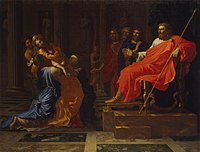 | Esther before Ahasuerus | 1655 | 119 x 155 cm | Painted for Sérisier, then in the Seigneley collection, then in the collection of the ducs d'Orléans, finally acquired by Catherine II of Russia. | Saint-Petersburg, Hermitage Museum | 212/36 |
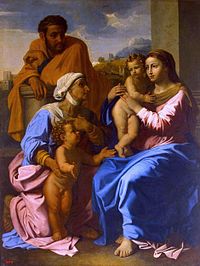 | Holy Family | 1655 | 172 x 133,5 cm | Walpole's collection before 1739. Acquired in 1779 by Catherine II of Russia | Saint-Petersburg, Hermitage Museum | 213/ |
 | Sainte Famille | 1655 | 198 x 128 cm | Possibly commissioned by the duc de Créqui. Formerly in the collection of the earls of Yarborough | Sarasota (Florida), John and Mable Ringling Museum of Art | 214/51 |
 | Saints Peter and John healing the lame man | 1655 | 126 x 165 cm | Painted for a treasurer in Lyon, Mercier. Collection of the prince of Liechtenstein from 1924. | New York, Metropolitan Museum of Art | 216/84 |
 | Holy Family with saints John, Elisabeth and Joseph praying | 1655 | 68 x 51 cm | Acquired in 1685 by Louis XIV | Paris, musée du Louvre | 217/57 |
 | Adoration of the Shepherds | 1655 c. | 96 x 134 cm | Collection of the Electors Palatine at Mannheim, inherited by the electors of Bavaria in 1777 | Oberschleissheim, now the Schloss Schleissheim (Bavaria State paintings collection)[23] | 221/41 |
 | Saint John baptising Christ | 1655–1657 | 92 x 129 cm | Reappeared in 1911 | Philadelphia, Museum of Art[24] | 220/ |
 | The Rest on the Flight into Egypt | 1655–1657 | 105 × 145 cm | Painted for madame de Montmort, wife of Fréart de Chantelou | Saint Petersburg, Hermitage | 219/ |
 | Achilles on Skyros | 1656 | 100,33 x 133,35 cm | Painted for the duc de Créqui. Attribution supported by Blunt but rejected by Thuillier | Richmond (Virginia), Virginia Museum of Fine Arts | 218/127 |
 | The Birth of Bacchus | 1657 | 123 x 179 cm | Painted for Jacques Stella, passed to the d'Orléans collection. Given to the Museum by Samuel Sachs in 1942 | Cambridge (Massachusetts), Fogg Art Museum | 226/ |
 | Annunciation | 1657 | 105,8 x 103,9 cm | Possibly painted for Dal Pozzo's funerary chapel in the basilica of Santa Maria sopra Minerva in Rome. Inscribed "Poussin faciebat. anno. salutis. MDCLVII. Alex. sept. Pont. Max. Regnante Roma" | London, National Gallery | 228/ |
 | The vision of saint Frances of Rome or Saint Frances of Rome announcing the end of the plague to Rome | 1657 c. | 125 x 102 cm | Painted for Giulio Rospigliosi. Reappeared on the art market after a disappearance of almost . Acquired by the Louvre in 1999[25] | Paris, musée du Louvre | 223/ |
 | The Flight into Egypt or resting on the journey | 1657–1658 | 146 x 216 cm | Reappeared in 1986, classified a 'trésor national'. Acquired in 2007, property of the musée du Louvre deposited at Lyon | Lyon, musée des beaux-arts | 230/61 |
 | Lamentation over the dead Christ | 1657–1658 c. | 94 x 130 cm | Acquired in 1882 by the duke of Hamilton | Dublin, National Gallery of Ireland | 229/83 |
 | Queen Zenobia found on the banks of the river Arax | 1657–1660 | 156 x 194,5 cm | Rospigliosi collection in 1713. | Saint-Petersburg, Hermitage Museum | 233/ |
 | Blind Orion Searching for the Rising Sun | 1658 | 119 x 182,9 cm | Painted for Michel Passart. Collection of Paul Sanford Methuen. Acquired by the Museum in 1924 | New York, Metropolitan Museum of Art | 227/169 |
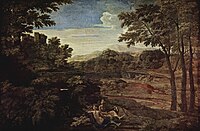 | Landscape with Two Nymphs | 1659 c. | 118 x 179 cm | Possibly painted for Charles Le Brun. Acquired with the Reiser collection by the duc d'Aumale | Chantilly, musée Condé | 231/208 |
 | Landscape with Hercules and Cacus | 1659–1661 c. | 156,5 x 202 cm | Acquired by Catherine II of Russia in 1772 from Hubert de Brienne de Conflans | Moscow, Pushkin Museum | 240/158 |
 | The Four Seasons : Spring or Adam and Eve or The earthly paradise | 1660–1664 | 116 x 160 cm | Series painted for Armand Jean de Vignerot du Plessis and passed into the French royal collection in 1665 | Paris, musée du Louvre | 234/3 |
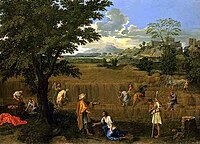 | The Four Seasons : Summer or Ruth and Boaz | 1660–1664 | 116 x 160 cm | Series painted for Armand Jean de Vignerot du Plessis and passed into the French royal collection in 1665 | Paris, musée du Louvre | 235/4 |
 | The Four Seasons : Autumn or The grapes of the promised land or The Grapes of Canaan | 1660–1664 | 116 x 160 cm | Series painted for Armand Jean de Vignerot du Plessis and passed into the French royal collection in 1665 | Paris, musée du Louvre | 236/5 |
 | The Four Seasons : Winter or The Flood | 1660–1664 | 116 x 160 cm | Series painted for Armand Jean de Vignerot du Plessis and passed into the French royal collection in 1665 | Paris, musée du Louvre | 237/6 |
 | Eleazar and Rebecca | 1660–1665 c. | 96,5 x 138 cm | Discovered by Anthony Blunt in 1933 and bought by the Museum on his death | Cambridge, Fitzwilliam Museum | 239/9 |
 | Landscape with Hagar and the Angel | 1660–1665 c. | 100 x 75 cm | Discovered in 1960 by André Chastel | Rome, Galleria Nazionale d'Arte Antica, palazzo Barberini | 241/ |
 | Apollo and Daphne or Apollo in love with Daphne | 1664 | 155 x 200 cm | Incomplete on Poussin's death, given to Camillo Massimi. Acquired by the Louvre in 1869 | Paris, musée du Louvre | 242/131 |
References
[edit]- ^ "Catalogue page". Découverte des collections des musées de Haute-Normandie. Archived from the original on 11 July 2012. Retrieved 4 June 2011.
- ^ (in Italian) Denis Mahon, Nicolas Poussin. I primi anni romani, Milan, 1998
- ^ (in French) La Mort de Chioné, un deuxième Poussin acquis par le musée des beaux-arts de Lyon
- ^ (in French) La Mort de la Vierge de Poussin restaurée
- ^ "Notice". Kimbell Art Museum. Archived from the original on 14 March 2012. Retrieved 4 June 2011.
- ^ "Catalogue entry". Bidarchiv SKD. Retrieved 4 June 2011.[permanent dead link]
- ^ "Notice Cat'zart". ensba.fr. Retrieved 4 June 2011.
- ^ Overview – The Israel Museum
- ^ (in French) Chroniques d’acquisitions annoncées : Poussin pour Montpellier et Ingres pour le Louvre
- ^ (in French) Olivier Bonfait, 'Poussin aujourd'hui', La Revue de l'Art, vol. 119, no 1, 1998, p. 73 note 24
- ^ Old master madness
- ^ Dulwich picture gallery
- ^ (in French) Incroyable vol au Musée Fesch d’Ajaccio
- ^ (in French) Tribulations d'un Poussin
- ^ 5093/Lot53 Christie's – Sale 5093, Lot 53
- ^ Olivier Bonfait, « Poussin aujourd'hui », art. cit., p. 72 note
- ^ The Rest on the Flight into Egypt
- ^ Olivier Bonfait, 'Poussin aujourd'hui, art. cit', La Revue de l'Art, vol 119, (1998), page 73, note 31
- ^ "Poussin painting 'copy' to hang in main galleries with new label". The Guardian. 29 April 2021. Retrieved 29 April 2021.
- ^ "Poussin painting valued at £15m fails to sell". BBC News. 8 December 2010.
- ^ French paintings in Germany Archived 7 October 2011 at the Wayback Machine
- ^ French paintings in Germany Archived 7 October 2011 at the Wayback Machine
- ^ French paintings in Germany Archived 7 October 2011 at the Wayback Machine
- ^ Valiela, Julia L. "The Baptism of Christ by Nicolas Poussin (cat. 773)". The John G. Johnson Collection: A History and Selected Works. A Philadelphia Museum of Art free digital publication.
- ^ Musée du Louvre[permanent dead link]
Bibliography
[edit]- Blunt, Anthony (1966). The Paintings of Nicolas Poussin. A Critical Catalogue. London: Phaidon. OCLC 1153562776 – via the Internet Archive.
- (in French) Jacques Thuillier, Tout l'œuvre peint de Poussin : Documentation et catalogue raisonné, Paris, Rizzoli-Flammarion, Les Classique de l'Art series, 1974, 136 p.
- (in French) Jacques Thuillier, Nicolas Poussin, Paris, Flammarion, 1994, 287 p. (ISBN 2-08-012513-3) – contains a summary of the 1974 work's catalogue
- (in French) Pierre Rosenberg, Nicolas Poussin (1594–1665), exhibition catalogue, Grand Palais, Paris, RMN, 1996


 French
French Deutsch
Deutsch